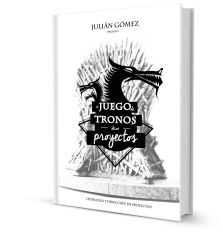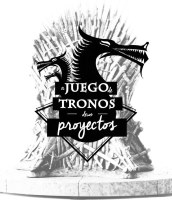22
2018
APGP Interview: Elias Michelioudakis Member of the Center of Excellence of Open Project Management Methodology PM²
Léelo aprox. en 6:45 minutos.
Last year I had the opportunity to participate in the Jornadas sobre Dirección de Proyectos held in Logroño organized by the Government of La Rioja and ThinkTIC in collaboration with the APGP. This year I have been able to collaborate with them in a new experience that I hope you like. Through the inestimable help and initiative of Juanma Domínguez we have interviewed each of the three speakers of the conference of this year under the title Back to the Future of Project Management. The three speakers this year were Elias Michelioudakis, Ángel Gavín and Ana Rosell (in order of intervention).
I leave you with the first of the 3 interviews about the future of Project Management with Elias Michelioudakis Member of the Center of Excellence of PM² the new methodology of Project Management developed by the European Commission.
The English version is currently available, but work is being done on its translation into Spanish, which will be completed by the end of this year or beginning of 2019. If you want to know more about this methodology, here is the link to the article I dedicated (in spanish) Todo sobre la Metodología Open PM² para la Dirección de Proyectos de la Comisión Europea.
This first interview will be special, because it will be in English in order to maintain the essence of the speaker’s answers.
Seasoned Project/Program manager With more than twenty five years of experience in global and multi-cultural environments. Now Working as a Management Consultant (intramuros) since June 2016 in Brussels Area, Belgium and within DIGIT.B – Digital Business Services (Directorate) – Software Engineering Capabilities (Unit).
During this period, he has been Project Managing Solutions Development in the domains of Identity & Access Management, Results Oriented Monitoring / Reporting Portal (based on Logframes, PCM, OPSYS programme), Experts Meeting Management (AGM) and (recently) in Blockchain.
Besides being a member of the Centre of Excellence (CoE) PM² – Methodology (CoP, training audits, participation in conferences, methodology development, tooling etc.), he was involved in numerous consultancies inside the European Commission but with other institutions too, providing advisory/coaching services, support in Project Office set up, Portfolio Management and IT Governance.
¿Quieres llevar tus Proyectos a otro nivel?
¿Las vas a dejar escapar? ¡Quiero ser el mejor! ¡Quiero ser la mejor!

These are the questions:
Julián: Can the way in which projects are managed in Europe be the way in which projects are managed in the world? Is the objective of Open PM² just to provide one more vision or is it to intend to be the best global vision?
Elias: PM² indeed brings something fresh to project management, but it doesn’t reinvent the wheel. There will always be variations in the way individuals, enterprises, institutions, countries, multi-national entities, regions etc. manage projects/change. What is good or best will always depend on the specific needs, so essentially it’s up to PM² users to decide. In an increasingly interoperable and integrated world, we consider PM² to be a step (for Europe) in the right direction.
Julián: If we summarized PM² quickly we could say that it is an adaptation of best practices (with a high deal of PMBOK) leaving the door open to new agile trends. Although we could be fairer by saying that it shows the great influence that PMI has had in recent years by adding the explicit management of suppliers in the “European way”, and leaving the door open to agility. Would we be much mistaken with this summary?
Elias: Agile was already quite popular (within the European Commission too) at the time that PM² was initially formulated (back in 2007) and therefore, the Agile Manifesto and practices influenced the methodology and the PM² mindsets in particular. This is obvious also in the iterative way PM² was developed over the last 11 years as well as the user-centricity of the methodology.
In short, the Agile spirit is present throughout and, at the same time, Agile practices are introduced within PM² to be in harmony with the enterprise processes, rules such as IT Governance, annual budgeting, program structures, architecture & interoperability requirements.
Many academics argue that “pastiche” is one of the most advanced forms of creativity. Being the “new kid on the block” PM², as Newton would say, “stands on the shoulders of giants”, integrates the globally recognised best practices and organizes them in an easy to use, comprehensive way to make project management truly useful to our society.
Julián: After a first reading you would expect more inclusion of agility, a trend that is no longer just software but is already appearing in marketing, architecture, etc. Are you working on this line for its direct inclusion or are you thinking of leaving it in the hands of the community?
Elias: Please see response on question 2. It is true that the Agile PM² Guide Extension (to be released soon as an EU Publication – see here link for PM² guide) mainly focuses on software development projects. As I mentioned, during the conference, Agile practices & techniques are already widely used outside of software engineering within the European Commission and, naturally, together with the community, we will attempt to further expand this. It is relevant, in this respect, to highlight the importance of the mindsets as explained during the Masterclass session of the Logroño conference.
Julián: What has been the secret to agreeing with so many experts from so many countries, since nowadays where we talk so much about consensus is shining by its absence?
Elias: There was/is a genuine need in the (initially internal to the European Commission in our case) market for a simple project management methodology that could be rolled out without extensive tailoring and customizations. But, of course, it was the people that delivered as always. As explained during the conference, magic happens when top down meets bottom up 😊
Julián: Being an Open Methodology is a great idea, project management is a discipline used all over the world in all or almost all areas. The PM² website is a very interesting point, but you can tell us if there is any idea to involve and dynamize communities of OPM² practitioners in different countries of Europe and the world.
Elias: This is very much the way forward, the way to go. The exact way that the PSN will materialize and the optimum way to organize this ever-growing community require a bit more time. The Community of Practice, internally, within the European Commission, was one of the most important pillars of the success story so far. Thank you in advance for your active participation in the upcoming initiatives on this front.
In our view, the Open PM² 2020 Initiative seeks to increase the effectiveness, efficiency and success of the thousands of projects and programmes undertaken by European Union Institutions, Member State Public administrations and private organisations. Specifically, it will, as outlined during the conference:
- Lead to the better management and exploitation of EU investment in project in the form of EU Grants, Structural Funds, EIB Loans, etc.
- Contribute to the modernisation of European Public Administrations and increase project management maturity within Europe.
- Facilitate higher success rates in project implementation
- Reduce cross-border and organisational barriers to collaboration – especially, as discussed, between SMEs
- Enable increased effectiveness, collaboration, efficiency and success in the coordination of projects in Europe
- Achieve synergies and efficiencies by establishing a common Project Management language and processes for projects within and across organisations
- Drive the professionalization of Project Management in Europe via DG EAC’s European Qualifications Framework (EQF)
- Contribute to the European integration project by
- a) providing a European Methodology and
- b) establishing collaboration with other European Project Management and Professional Associations.
- Provide free and well-structured Project Management Methods and material to Universities
- Help realize the vision for a Digital Single Market and Digital Public Administration within the EU.
Puedes consultar el resto de los artículos de esta serie que también te pueden interesar.

Consigue Más de 100 Libros gratis
Suscríbete a nuestro newsletter por email y conseguirás Más de 100 Libros Gratis sobre Gestión de Proyectos, Innovación, Emprendimiento, Empresa, etc. directamente en tu correo
Últimos artículos de Julián Gómez (ver todos)
- El Último vídeo del viernes del año: Vuela como un dragón - hace 4 meses
- Ultimo video del viernes del año: Sé diferente - hace 1 año
- Vídeo del viernes: Kadenko, una luz en la navidad - hace 1 año














Excellent explanation about the PM2 methodology and it’s future, Elias. Looking forward to further news on this and other areas of development.
[…] Who is? […]
[…] APGP Interview: Elias Michelioudakis […]
[…] See also: APGP Interview: Elias Michelioudakis Member of the Center of Excellence of Open Project Management M… […]